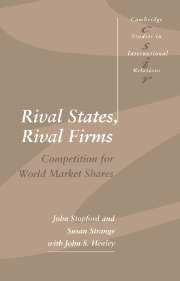Book contents
- Frontmatter
- Contents
- List of figures
- List of tables
- Acknowledgements
- 1 THE NEW DIPLOMACY
- 2 STRUCTURAL CHANGES
- 3 GLOBAL COMPETITION
- 4 DILEMMAS FOR GOVERNMENTS
- 5 LOCAL DECISIONS FOR FIRMS
- 6 SOCIAL CAUSE AND CONSEQUENCE (by John Henley)
- 7 THE WAY FORWARD
- Appendix: Brazil, Kenya, Malaysia
- Notes
- References
- Index
1 - THE NEW DIPLOMACY
Published online by Cambridge University Press: 20 October 2009
- Frontmatter
- Contents
- List of figures
- List of tables
- Acknowledgements
- 1 THE NEW DIPLOMACY
- 2 STRUCTURAL CHANGES
- 3 GLOBAL COMPETITION
- 4 DILEMMAS FOR GOVERNMENTS
- 5 LOCAL DECISIONS FOR FIRMS
- 6 SOCIAL CAUSE AND CONSEQUENCE (by John Henley)
- 7 THE WAY FORWARD
- Appendix: Brazil, Kenya, Malaysia
- Notes
- References
- Index
Summary
The upheavals of the international political economy during the last decade have altered, irreversibly we believe, the relationships among states and multinational enterprises. Growing interdependence – that much abused word – now means that the rivalry between states and the rivalry between firms for a secure place in the world economy has become much fiercer, far more intense. As a result, firms have become more involved with governments and governments have come to recognise their increased dependence on the scarce resources controlled by firms. This mutual interdependence of states and firms throughout the world is the subject of this book; even though the detailed material is drawn from just three countries – Brazil, Kenya, Malaysia – we believe it raises new and universal questions just as relevant in Eastern Europe, the Soviet Union or China as in the third world.
We start our questioning with six general propositions. The first is that states are now competing more for the means to create wealth within their territory than for power over more territory. Where they used to compete for power as a means to wealth, they now compete more for wealth as a means to power – but more for the power to maintain internal order and social cohesion than for the power to conduct foreign conquest or to defend themselves against attack. The implication is that national choices of industrial policy and efficiency in economic management are beginning to override choices of foreign or defence policy as the primary influences on how resources are allocated.
- Type
- Chapter
- Information
- Rival States, Rival FirmsCompetition for World Market Shares, pp. 1 - 31Publisher: Cambridge University PressPrint publication year: 1991



